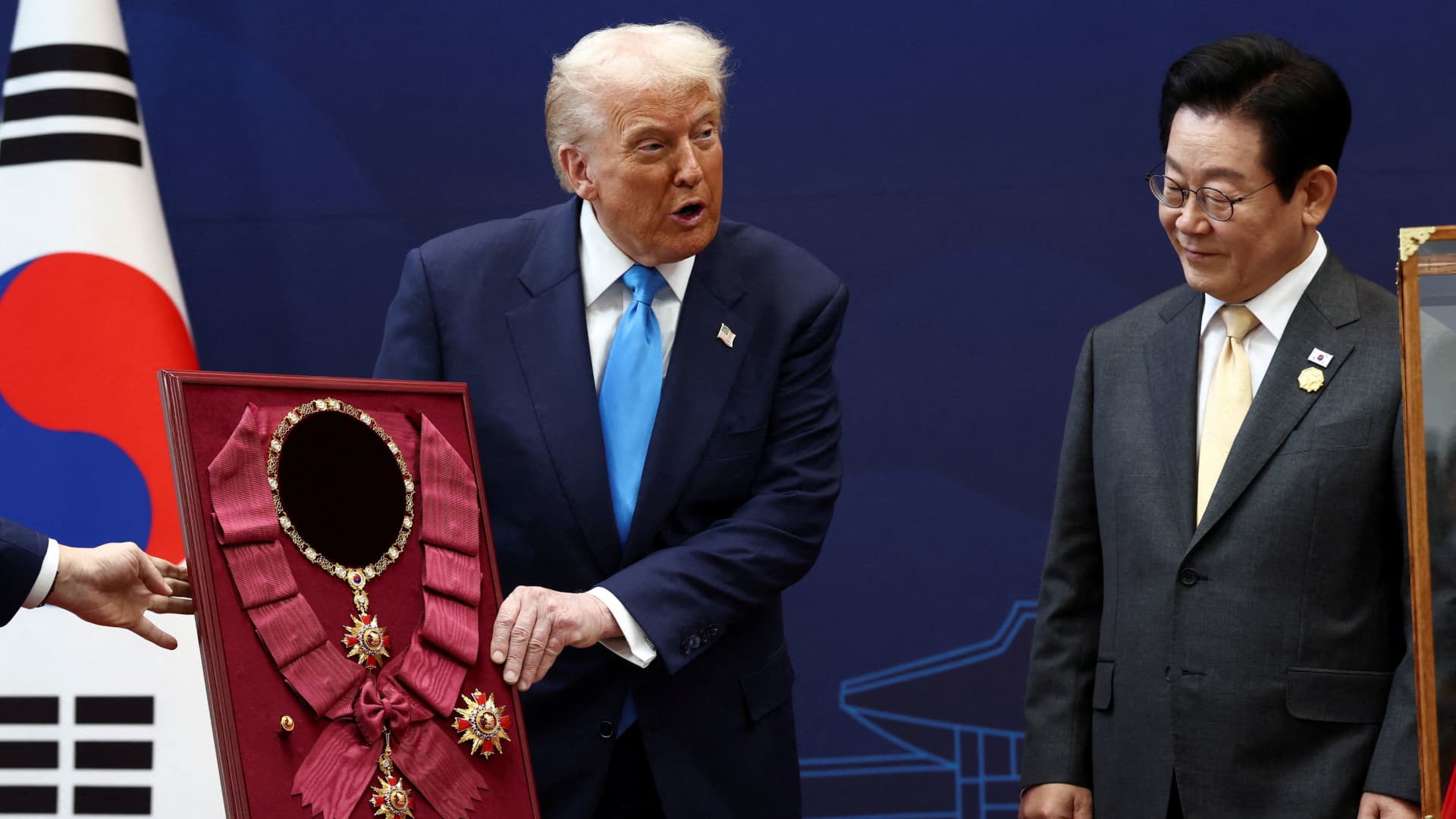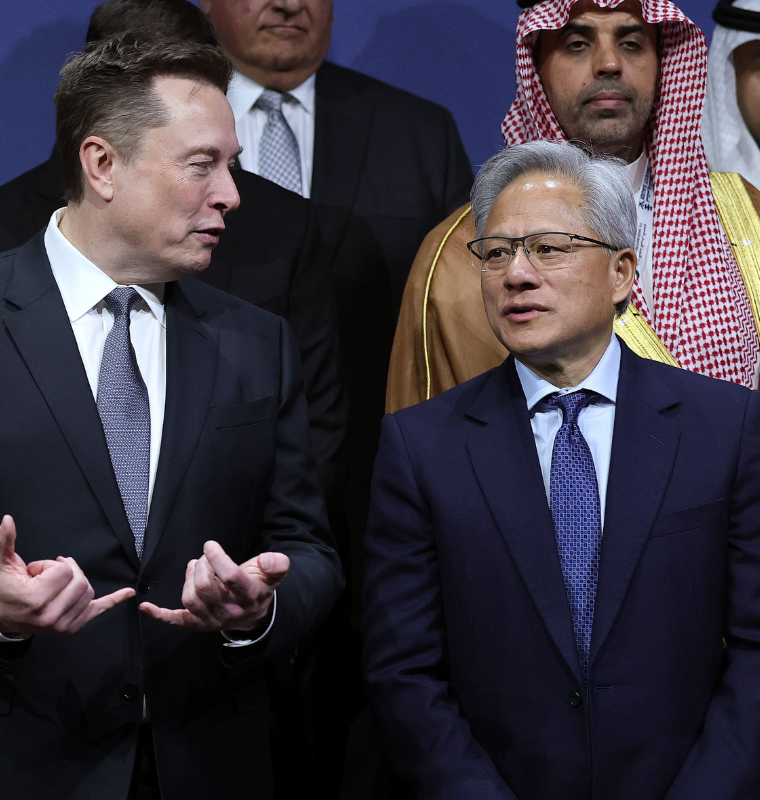Samsung, Hyundai and Other Korean Giants Commit to Massive Domestic Investment After US Trade Deal
Samsung, Hyundai and Other Korean Giants Commit to Massive Domestic Investment After US Trade Deal
By
Junia Wells
Last updated:
November 17, 2025
First Published:
November 17, 2025

U.S. President Donald Trump is presented with the “Grand Order of Mugunghwa” during a meeting with South Korean President Lee Jae Myung on the sidelines of the Asia-Pacific Economic Cooperation (APEC) leaders’ summit in Gyeongju, South Korea, October 29, 2025.
Evelyn Hockstein | Reuters
A Bold Domestic Investment Push
In a landmark meeting with President Lee Jae-myung, some of South Korea’s most powerful companies — including Samsung Electronics, Hyundai Motor, SK Group, and major shipbuilders — pledged to dramatically ramp up domestic investments. Their announcements come on the heels of a newly finalized $350 billion trade agreement with the United States, signaling that the corporations are committed to strengthening Korea’s economic backbone even as they expand abroad.
The trade deal, struck between Washington and Seoul, saw South Korea promising $350 billion in U.S. investments. In return, the U.S. rolled back its threat of aggressive tariffs. The big domestic pledges, announced just days after that deal, may help to assuage public concerns that Korean firms would abandon home soil for American markets.
Samsung Lays Out Ambitious Five-Year Plan
Samsung Electronics, already a global semiconductor leader, revealed it will invest 450 trillion won (roughly $310 billion) over the next five years to expand its local operations. A key component of this investment is a new production line at its Pyeongtaek factory, expected to go live in 2028, aimed at meeting surging global demand for memory chips powered by artificial intelligence applications.
But Samsung isn’t stopping there. It also plans to build AI data centers in two regions outside Seoul — South Jeolla Province in the southwest and Gumi in the southeast — matching the government’s push to narrow regional inequality by distributing economic opportunity more evenly across the country.
Hyundai and SK Join the Strategic Move
Hyundai Motor, South Korea’s largest automaker, committed 125 trillion won (about $86.3 billion) from 2026 to 2030. This investment will go into domestic R&D, particularly targeting next-generation technologies such as AI, robotics, and autonomous driving.
SK Group, an important name in semiconductors and energy, pledged at least 128 trillion won (~$88.3 billion) of Korean investment through 2028, focusing on AI and other growth sectors. Shipbuilding giants like Hanwha Ocean and HD Hyundai also confirmed they will accelerate spending on domestic infrastructure — a move partly linked to fulfilling Seoul’s commitments under the new U.S. trade deal, which specifically emphasized U.S. shipbuilding cooperation.
Government Backing and Policy Support
President Lee praised the business leaders for helping secure the U.S. trade deal, but he also urged them to maintain strong investment at home. He acknowledged public anxiety that corporate growth could skew too heavily toward the U.S., and committed to supporting domestic investment with regulatory reforms, incentives, and tax measures.
Those reforms could make it easier for large firms to build factories, expand R&D, and develop high-tech infrastructure within South Korea, according to comments from government insiders and business sources.
Trade Deal Details and Strategic Balance
Under the newly disclosed trade deal, South Korea has reserved $150 billion of its U.S.-bound investment for American shipbuilding. Another $200 billion will flow into various U.S. sectors. Seoul has capped these commitments at $20 billion annually to avoid destabilizing capital outflows.
On the tariff front, Washington will reduce duties on South Korean autos and auto parts from 25% to 15%, and has pledged to treat South Korean semiconductors as favorably as other international competitors in future tariff assessments.
Why These Moves Matter
This dual-pronged strategy allows Korean corporations to reap the benefits of foreign expansion via U.S. investments — while also reassuring domestic stakeholders that local economic leadership, manufacturing strength, and technological innovation remain core to their mission.
In the long term, the investments could help South Korea:
- Build more advanced semiconductor and AI infrastructure
- Create high-paying jobs in regions outside Seoul
- Strengthen its strategic economic independence by developing critical industries at home
For investors, the announcements signal confidence from South Korea’s corporate elite in their domestic market, even as they lean into globalization through the U.S.-Korea trade pact.
Popular articles
Subscribe to unlock premium content
How Adults Are Paying to Experience Silent Daylong Festivals for Mindfulness

The Rise of Ultra-Personalized Scent Memory Experiences Using Olfactory Therapy

Why Some Millennials Are Paying for One-Day Luxury Survival Challenges in Nature

How Adults Are Paying to Experience Silent Daylong Festivals for Mindfulness

The Rise of Ultra-Personalized Scent Memory Experiences Using Olfactory Therapy

How Adults Are Paying to Experience Silent Daylong Festivals for Mindfulness







.png)

